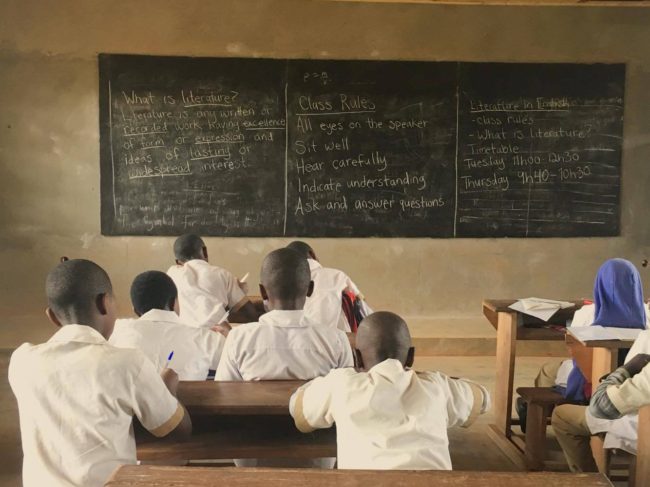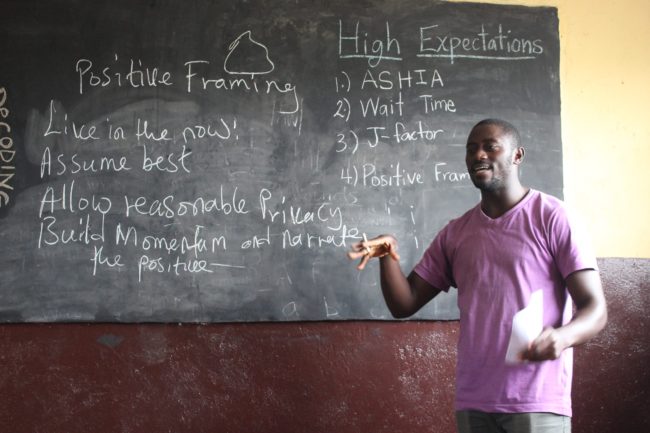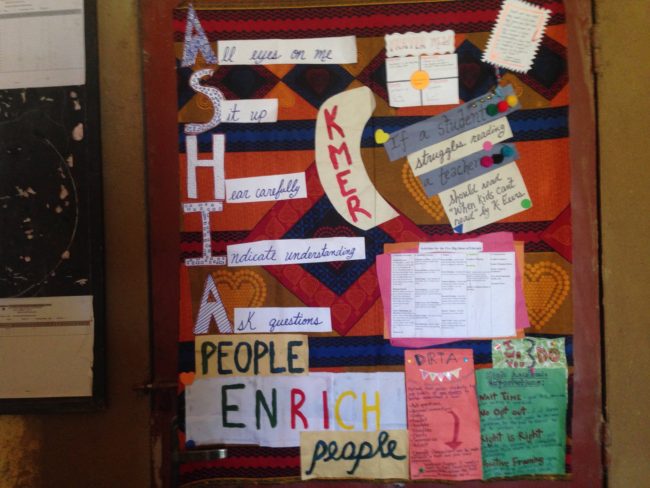01.05.18Two Tales from Peace Corps Africa–But Useful for Teachers Everywhere

A classroom in Cameroon, ASHIA replacing SLANT.
This year I’ve had the pleasure of connecting with Dee Hertzberg and Audrey Spencer, who help direct teaching programs for the Peace Corps in Africa. They use Teach Like a Champion there and this has led to a series of amazingly useful conversations about education in Africa, sure, but also about teaching and learning more broadly–the stories they share useful to educators everywhere and so having shared one post recently about gender equitable teaching, I thought I’d share two more.
The first is this reflection written by Kathleen Nelson, who teaches math in Liberia. Her good humor about the challenges of teaching is positively graceful: “Like many classrooms across Liberia, mine is what you might call ‘spatially challenged,'” she notes. This refers to having seventy students in her class and little room to move.
But she’s also brilliant about describing the small moves she makes in her teaching and how they change the classroom, her relationships, and in the end help her to achieve the sorts of successes that made her want to teach in the first place.
For example, she puts her desks in rows to make the space more orderly and to let her circulate more and finds:
Being able to walk up and down the aisles of desks has helped me get to know my students, their abilities and more importantly, how best to encourage their talents….
I love that line. A little bit of structure helps her to be more intentional about how she interacts and as a result she finds a student whose journey she had missed:
Like me, she is never the first to raise her hand (if she raises it at all). She is quiet, well-behaved and dedicated to her work. In a class of seventy, some are more eager than others to share their knowledge, she’s easy to overlook. Taking the time to stop and glance over her work revealed a young woman with such great potential to succeed in mathematics and there our journey began.
Ultimately the connection she builds in giving the student encouragement leads her to boldly come to the board and solve a math problem. Kathleen sees in the end, just possibly, a different vision of what she can offer her girls, and all her students.
It’s beautifully written and a case study in how small changes in how we do what we do can change the world for our students–and just maybe remind us of how much is within our span of control.
You can read it here: https://www.peacecorps.gov/liberia/stories/finding-your-champion/
I also wanted to share a story and some pictures that Audrey shared. She was describing their work in Cameroon and how important it was to have structures–procedures and routines–to help students succeed. They liked the idea of SLANT but decided to adapt it to the Cameroonian context.
They decided to call it “ASHIA” instead. Ashia is a Cameroonian pidgin term that can be used interchangeably to convey greeting, respect, thanks, or even blessing, like a “bless you” when someone sneezes. It most directly correlates to the term struggle or suffer, which in the Cameroonian context could be similar to the way Americans would frame “persist” or “try.” You might here someone say, “Ashia, sister” as an icebreaker or to show caring.
As I’ve written about often in this blog, I love it when educators take the ideas in TLAC and adapt them to local context or personal approach. They are supposed to be tools that serve the goals of teachers, and I think this is a beautiful example of how a tool is made better by being adapted.
For fun, here are a few snapshots from Cameroon:
First, here’s a picture of a training session for teachers showing the techniques the leadership team has selected to focus on. ASHIA is at the top but it’s combined with lots of other great tools that you’ll probably recognize.

Next here’s a picture of the ASHIA bulletin board in one classroom. It’s distinctive and universal. A Cameroonian adaptation but the display could be in almost be any classroom anywhere.


Our foundation is opening a new school in Jan. 2019 in the rural lands of the Maasai tribes. We are seeking female teachers to teach levels 1-2-3 or preschool. The school is very well equipped as far as curriculum goes. the 300 anticipated children speak no English, have no idea what a toothbrush is, and most if not all have never seen a book.
Nice, well furnished teacher housing is available at no cost to the teacher. A garden and a poultry project will help to provide food for teachers and the school’s feeding program.
If you are up for adventure and would love to work with these beautiful children contact Dr. Donna Gunn,Executive Director Africa’s Promise Village. Contact information: Readingassociates@gmail.com 5112-350-5880.